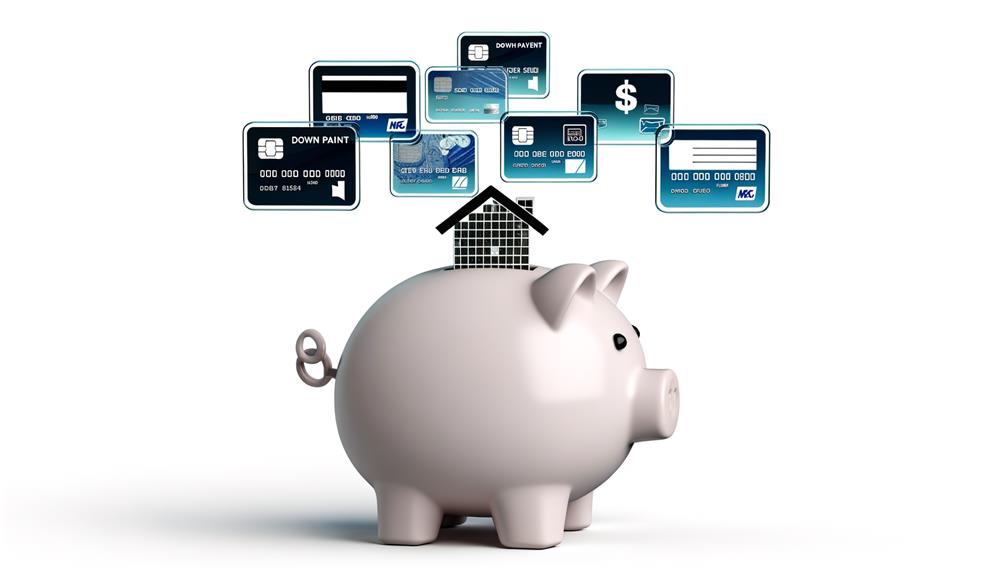In the realm of real estate transactions, the nuances of financial dealings can be complex and often misunderstood. A fundamental question that many potential homeowners grapple with is whether cash can be utilized for the down payment on a house.
Conventional wisdom might suggest that cash, being the most basic form of legal tender, should be acceptable for such transactions. However, the reality is a bit more intricate, requiring a detailed understanding of financial regulations, the implications of untraceable funds, and the practices of lenders in the housing market.
In the following discourse, we will explore the legitimacy of using cash in the context of house down payments, the potential pros and cons, and the broader implications in the real estate industry. The objective is to provide clarity on this subject and equip potential homeowners with the necessary knowledge to navigate the home-buying process efficiently.
Key Takeaways
- Cash is not typically recognized as a qualified asset by lenders during the mortgage application process.
- Cash deposits, such as saved cash or gifts, require thorough verification of the source and a seasoning period of at least two months.
- Using cash for a down payment can lead to immediate equity gains, reduced mortgage payments, and potential financial relief in the long term.
- However, using cash as a down payment can complicate the home-buying process, raise questions about legality and legitimacy, and may result in problems with legal authorities or cancellation of the sale.
Understanding Down Payments
When it comes to understanding down payments, it is crucial to note that cash, while a common form of payment, is not typically recognized as a qualified asset by lenders during a mortgage application process. Lenders are more inclined to trust verifiable assets, which are easier to track and evaluate. This preference is largely due to the potential legality issues associated with untraceable cash sources, such as potential illegal activities or tax evasion.
However, it's not wholly impossible to use cash as a down payment. Lenders will require a thorough verification of the source of cash deposits, particularly for non-typical deposits like saved cash or gifts. This process often involves 'seasoning' the money, a standard underwriting requirement. This means that the cash should be deposited and reflected in the bank statements for at least two months to ensure its legitimacy.
Planning is crucial when considering using cash for a down payment. Seek professional guidance and deposit the cash well ahead of the mortgage application to navigate around potential complications.
Understanding down payments is a key step to feeling a sense of belonging in your future home.
Legal Aspects of Cash Payments
Navigating the legal terrain that encapsulates cash payments for home down payments can be complex. It is crucial to understand cash transaction laws and the reporting requirements that accompany large cash payments.
Additionally, being aware of the potential risks associated with cash down payments can greatly assist in making informed decisions.
Understanding Cash Transaction Laws
To comprehend the legal aspects of cash payments, it's imperative to understand that cash, though tangible and readily available, is not classified as a qualified asset in the realm of mortgage applications. Lenders necessitate the verification of cash sources.
Deposits like paychecks or tax refunds are easily verified, but cash gifts or savings require additional documentation. Depositing cash in a bank makes it trackable and usable for a down payment when buying a house with cash. It's crucial to season the money, having it in the bank for at least two months to ensure its legitimacy.
Texas residents should particularly ensure to comply with these guidelines and consider consulting a professional for clarity.
Cash Payment Reporting Requirements
Having elucidated the importance of understanding cash operations for mortgage applications, it is now pertinent to explore the legalities surrounding cash payment reporting requirements.
These requirements are a key component of the legal framework governing mortgage applications. Cash, while tangible, is not considered a qualified asset due to industry guidelines and a need for traceability.
Lenders require documentation that verifies the source of cash deposits, with varying requirements for typical and non-typical sums. Emphasizing the need for caution, lenders may deduct cash from dubious sources from total qualified assets. Therefore, seasoning cash for at least 60 days is standard.
Planning ahead, making timely bank deposits, and seeking professional guidance are steps that can aid in navigating these requirements.
Risks of Cash Down Payments
Despite the allure of the immediate liquidity that cash offers, it behooves prospective homeowners to consider the range of legal risks associated with utilizing cash for down payments on a property.
The risks of cash down payments include cash's non-recognition as a qualified asset in the mortgage industry. Lenders require verification of cash sources, with non-standard deposits necessitating further documentation.
The legality of cash sources is a significant concern, hence lenders' cautiousness towards potentially illicit cash sources. The 60-day seasoning period, a standard requirement for cash down payments, further complicates the process, necessitating documentation of cash deposits.
Therefore, understanding these risks is crucial for an informed decision on property purchase financing.
Pros of Cash Down Payments
Utilizing cash for a down payment on a house comes with significant advantages.
Firstly, it allows for immediate equity gains, essentially reducing the amount owed on the property from the get-go.
Furthermore, it results in reduced mortgage payments, offering an opportunity for financial relief in the long term.
Immediate Equity Gains
One significant advantage of making a large cash down payment is the immediate equity gain in the property, a strategic move that showcases your financial stability to lenders. When you use cash, it reflects your strong financial standing and commitment.
Increase in Home Equity: A larger down payment means you own a greater proportion of your home outright, increasing your equity.
Lower Loan Amount: Your mortgage is smaller, leading to potentially lower monthly payments and less interest paid over time.
Improved Mortgage Rates: Higher down payments often result in favorable mortgage rates, as lenders perceive less risk.
Using cash for down payments can be a powerful step in establishing your foothold in real estate, fostering a sense of accomplishment and belonging.
Reduced Mortgage Payments
Building on the benefits of an increased equity gain, another notable advantage of substantial cash down payments is the potential for significantly reduced mortgage payments. By decreasing the amount of loan needed, monthly mortgage payments become more manageable.
This financial strategy can also negate the necessity for private mortgage insurance, a typical requirement for conventional loans with low down payments. Furthermore, a considerable cash down payment may qualify borrowers for lower interest rates, fostering long-term savings on mortgage payments.
Lenders often view substantial cash down payments as a sign of reliability, potentially facilitating mortgage approval and favorable terms. Ultimately, using cash for a larger down payment can lead to reduced overall borrowing costs and expedite equity build-up.
Cons of Cash Down Payments

While using cash for a down payment on a house might seem like a straightforward approach, it does present several drawbacks, primarily because cash is not regarded as a qualified asset in the mortgage application process. This reality brings us to the first con of using cash as payment to buy a house.
- Cash deposits may not fit neatly within the mortgage industry guidelines. Lenders have specific procedures to maintain the integrity of the transaction. This means cash can complicate the process, leading to potential delays or even rejection of your application.
- Tracking the source of physical cash is inherently difficult. Without a reliable means of verifying the legality and source of the funds, lenders may be hesitant to accept cash payments. This uncertainty can cause discomfort and anxiety, potentially derailing your home-buying journey.
- The requirement for cash to be 'seasoned' for 60 days means careful planning is needed. This seasoning process requires timing and documentation that could lead to complications if not properly handled.
Risks of Untraceable Money
In the realm of real estate transactions, untraceable money presents a myriad of risks that can significantly complicate the home-buying process. When funds are untraceable, it raises questions about the legality and legitimacy of the money used for the payment on a home. This could potentially lead to problems with legal authorities, or even the cancellation of the sale.
Moreover, untraceable cash payments on a home can also lead to difficulties in obtaining a mortgage. Lenders require a paper trail to verify the source of your down payment. Without this proof, lenders may deny the loan application, delaying or even derailing your home purchase plans.
Furthermore, untraceable money lacks the protection that traceable forms of payment provide. In case of disputes or discrepancies, having a paper trail is vital to establish the facts and resolve the issue. Also, untraceable cash can make it harder to recover your money if you fall victim to a scam or fraudulent transaction.
Alternatives to Cash Payments

While cash remains a common method for covering the down payment on a house, several alternatives present noteworthy advantages.
Personal loans, for instance, can provide the necessary funds in a structured, manageable repayment plan.
Additionally, the strategic use of credit cards and the various options offered by mortgage lenders merit consideration in navigating the path to homeownership.
Understanding Personal Loans
Personal loans serve as a viable alternative to cash payments for a down payment on a house, offering a funding source that complies with mortgage industry regulations.
When planning to buy a house, consider these points:
- Understand the impact of taking a personal loan on your financial portfolio. This includes the interest rates, repayment terms, and influence on your credit score.
- Explore multiple lenders to find a loan with the most favorable terms and rates that align with your financial goals.
- Evaluate your capacity to manage the additional debt responsibly, ensuring it fits into your long-term financial plans.
Seeking professional advice can provide valuable insights and guidance, ensuring you belong to a community of informed and responsible homeowners.
Credit Card Advantages
Shifting our focus from personal loans, credit cards emerge as another viable alternative to cash payments, offering a host of advantages from convenience to building credit. They provide a secure way to make purchases, eliminating the need to carry large amounts of cash.
Moreover, responsible use of credit cards aids in building a positive credit history, crucial for future financial endeavors. Some cards even offer rewards programs, providing additional benefits for everyday spending. Furthermore, credit cards offer built-in consumer protections like purchase protection and fraud liability, offering added transaction security. They can also serve as an emergency fund, providing payment assistance when immediate cash is needed.
| Advantage | Detail | Impact |
|---|---|---|
| Convenience | Secure cashless transactions | Ease of use |
| Credit Building | Positive credit history | Future financial opportunities |
| Rewards | Benefits on everyday spending | Additional value |
| Consumer Protections | Purchase and fraud protection | Increased transaction security |
Mortgage Lender Options
Diving into the realm of mortgage lender options, it becomes evident that apart from cash payments, numerous alternatives exist, each with its own unique set of requirements and benefits.
- Seasoning the Money – For those who prefer cash payments, it's important to 'season' your money in a bank account for at least 60 days prior to use, satisfying most banks' underwriting requirements.
- Planning Ahead – Ensure to deposit your cash early, preferably 61 days before purchasing a home to avoid any complications during the financing process.
- Financial Assistance – Exploring other mortgage lender options, consider seeking financial assistance or grants available specifically for homebuyers. This not only diversifies your options but also expands your sense of belonging in the home-ownership community.
Process of Buying a House

The journey towards homeownership initiates with an understanding of the intricate process involved in buying a house, which centers around crucial steps like budgeting, house hunting, securing a mortgage, and, importantly, arranging for a cash down payment. This process, while complex, is a rite of passage into a community of homeowners, fostering a sense of belonging and accomplishment.
| Steps | Description | Emotion |
|---|---|---|
| Budgeting | Understanding your financial capabilities and setting a realistic budget | Empowerment |
| House Hunting | Searching for a house that fits your budget and lifestyle | Excitement |
| Securing a Mortgage | Navigating the mortgage process and securing a loan | Relief |
| Cash Down Payment | Saving and arranging for a cash down payment | Triumph |
The process of buying a house is rich with emotions- from the empowerment that comes with financial planning, the excitement of house hunting, the relief when your mortgage is approved, to the triumph of arranging a cash down payment. While the journey is undoubtedly challenging, it is also rewarding, offering a sense of belonging and security that only homeownership can provide. This community awaits you, ready to welcome you home.
Mortgage Versus Cash: A Comparison
Frequently, prospective homeowners find themselves at a crossroads, weighing the merits of securing a mortgage versus utilizing cash for the down payment on a house, an assessment that necessitates a detailed understanding of each approach's intricacies.
Securing a mortgage may seem daunting, but it provides a structured repayment plan, typically spread over many years. Conversely, utilizing cash implies having the full money to buy a house at hand, an option often considered less stressful.
However, three critical points differentiate these two approaches:
- Mortgages require a comprehensive financial history, while cash transactions demand adequate 'seasoning' to prove legitimacy.
- Mortgages offer potential tax benefits, whereas cash transactions do not.
- Mortgages may lead to a long-term financial commitment, while cash transactions offer immediate, full ownership.
In essence, the choice between a mortgage and cash depends largely on individual circumstances, financial readiness, and personal preferences.
Tips for First-Time Homebuyers

Navigating the home-buying process can be a daunting task, especially for first-time homebuyers, and understanding the role of cash in the context of a down payment can aid in making informed decisions. When considering cash for your down payment, remember that it is not a qualified asset unless it has been deposited and seasoned in a bank account for at least 60 days.
Lenders need to verify the source of your cash deposits; typical deposits like paychecks are easily sourced, while non-typical deposits may require additional documentation. Any concerns regarding the legality of your cash deposits can impact your mortgage application, as lenders can deduct cash from illegal sources from your total qualified assets.
Exploring options for financial assistance or grants can open doors to alternate methods of securing your down payment, including the possibility of using someone else's money.
Lastly, first-time homebuyers should familiarize themselves with the minimum down payment requirements for different types of mortgages. For instance, conventional loans require a minimum down payment, while VA and USDA loans do not. This knowledge empowers first-time home buyers in their journey towards homeownership.
Navigating the Real Estate Market
Understanding the nuances of the real estate market is a vital step in your home buying journey, especially when it comes to managing cash down payments efficiently and effectively. Owning a home is a shared aspiration, and making an informed decision about it requires careful consideration of your financial situation.
- Mortgage Types: Different mortgages have varying minimum down payment requirements. For instance, conventional loans may require as low as 3% of the purchase price. Understanding these nuances is crucial before applying for a mortgage.
- Interest Rates and Payments: The size of your down payment can influence the interest rate on your mortgage and, consequently, the monthly mortgage payments. Larger down payments can result in lower interest payments and potentially avoid the need for private mortgage insurance.
- Closing Costs: These are expenses over and above the price of the property that buyers typically pay upfront. It's a good idea to account for this in your budget.
Frequently Asked Questions
Can You Give Cash as a Down Payment on a House?
Yes, unconventional downpayments like cash can be used for a house purchase. However, lenders require documentation of its source and typically, the funds should be seasoned in a bank account for verification purposes.
Can I Use Cash as Down Payment?
Yes, cash can be used for a down payment on a house, but it requires proper documentation. Lenders need to verify the source of cash to ensure its legality, making cash documentation crucial in this process.
Why Can't I Use Cash for a Down Payment on a House?
Cash can't be used directly for a down payment due to cash verification challenges. Much like a puzzle, lenders need to trace and document the origin of funds to ensure legality and financial stability.
Is It Okay to Borrow Money for a Down Payment on a House?
Borrowing money for a down payment on a house is permissible, yet it comes with loan implications. These may include higher interest rates, increased mortgage insurance, and additional scrutiny during the loan approval process.
Conclusion
In conclusion, utilizing cash for a house down payment entails both advantages and disadvantages. It's akin to a double-edged sword, providing financial freedom but also posing potential legal issues.
Therefore, it is pivotal to ensure proper seasoning of funds and seek professional guidance to navigate this intricate process. This approach will help potential homeowners avoid financial pitfalls and successfully tread the path towards homeownership.


